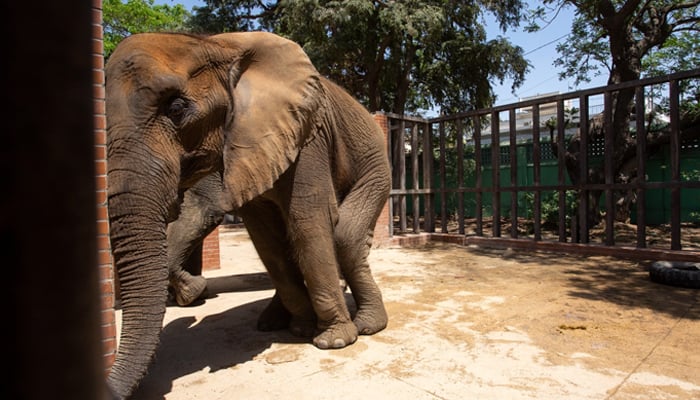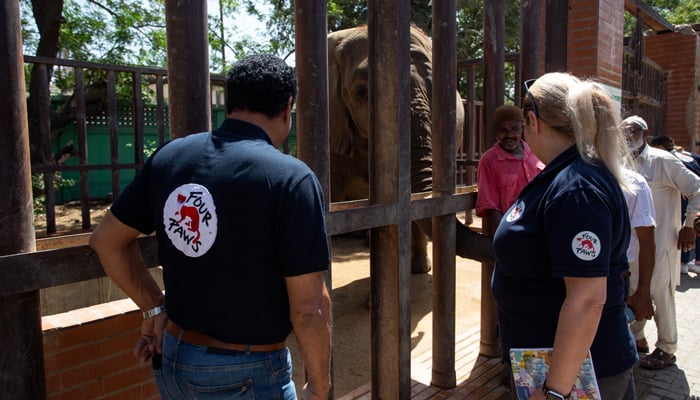'Noor Jehan' successfully undergoes medical examination
To treat her, Four Paws says, she needs a lot of movement to activate and train the muscles again, which will also improve gastrointestinal mobility
KARACHI: A team of international experts has successfully examined Noor Jehan, the 17-year-old African elephant, whose health has deteriorated at Karachi Zoo.
A team of veterinarians and wildlife experts from the global animal welfare organisation — Four Paws — is in the port city to treat the 17-year-old African elephant.
The South Asian nation is facing one of its toughest economic crises, struggling with external debts, historic high inflation, and sluggish growth prospects, among other wide-ranging issues.
This turmoil has not only affected people, but animals as well. Following reports of Noor Jehan's inadequate care, an outcry erupted on social media, after which the international organisation's team landed in the city.
In a statement after the examination, the organisation said that as planned, the team, together with the support of the caretakers from the zoo, fixated and stabilised Noor Jehan with ropes carried by a crane.
As soon as she was in the right position the experts started to sedate her in order to perform the planned assessment. However, soon after the sedation started to work, Noor Jehan was not strong enough to stand on her own feet, even with the support of the crane.
Quickly the vets gave the prepared antidotes to revere the sedation. Luckily, it was still possible to carry on with the examination as the team managed to calm her down by talking and standing by her side while the expert vets performed their procedures.
The examination started with the thermal infrared camera which luckily showed no broken bones, however, the results of the ultrasound, revealed the cause of her severe condition.
"We could detect an inner hematoma with a damaged pelvic diaphragm. These findings showed clearly that trauma must have happened, which has caused her painful health condition and also explaining her unusual body position."
The hematoma compresses the urethra and disturbs urination, which influences kidney function, the statement mentioned.
Further, in the intestines, there is a lot of gas due to long-term immobilisation, the organisation said, noting that due to the unusual posture of the body, the ligaments of her hind legs shortened and the muscles atrophied.
To treat her, Four Paws said, she needs a lot of movement to activate and train the muscles again, which will also improve gastrointestinal mobility.
Further, a special diet is required to reduce the amount of gas in the intestines. Furthermore, laboratory and histology tests and treatment of open wounds have been conducted. The team applied medications, vitamins, pain killers and hydrotherapy.
"Tomorrow the team will prepare special recommendations including medical treatment as well as enrichment in the enclosure which will help to relieve the pain and the recovery."
-
Security forces gun down 30 terrorists in multiple IBOs in KP: ISPR
-
MQM-P calls for new province in Sindh
-
US report validates Pakistan military edge over India: PM
-
Banned TTP poses serious threat to Pakistan security: UNSC panel
-
CM Afridi clarifies remarks on by-poll after ECP requests army deployment
-
Dubai sees 3.2m Pakistani passengers in 2025 as airport sets new milestone
-
Security forces kill 23 Indian proxy terrorists in KP's Kurram
-
Pakistan to construct island to boost oil exploration: report













